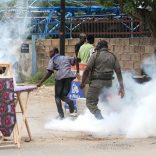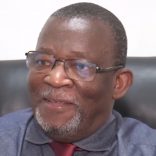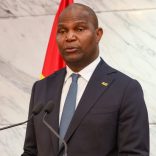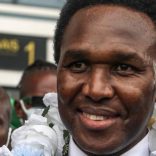Mozambique: PGR opens 31 legal proceedings against police officers - AIM
Cautious steps toward peace and elections – By Joseph Hanlon

File photo / Filipe Nyusi
President Filipe Nyusi is playing a multi-level chess game with his own party and military as well as with the Renamo opposition, with initial moves being made at the Frelimo Congress this week and in the days before.
Some in Frelimo worry that the party structures have become corrupt and complacent, and that there is a danger that Frelimo could do badly in municipal elections in October 2018 and national elections in October 2019. With endemic corruption, the $2 billion debt scandal, and a lack of poverty reduction in rural areas, could there be a Trump/Brexit-like backlash against the establishment party, Frelimo?
In a speech to the Congress on Wednesday Nyusi noted that in the 2014 presidential election Frelimo won only 2.8 million votes (58%) when they party claimed it had 4.2 million members. He also noted that the number of Frelimo parliamentary deputies fell from 191 elected in 2009 to 144 in 2014. (AIM En 27 Sep)
On Tuesday Nyusi told the Congress that “zero tolerance towards corruption must begin in our own ranks. … It should be the norm from the top to the grass roots. Nobody should abuse their position. This Congress should be proof that such abuses – bribery, extortion, and all other violations – must not go unpunished”. Nyusi declared “under the rule of law, leaders must first serve the people and the country. If we were able to overcome colonial rule, we have to be able to win the battle against corruption … We don’t want to be part of a society where the rich suffocate the poor”. (Aim En 26 Sep)
Integrating Renamo into the military
There seems broad agreement that there will be elected provincial governors and that a constitutional amendment could go to parliament this year. The other part of Renamo head Afonso Dhlakama’s demands is more difficult – integration of Renamo into sufficiently senior posts in the military, police, and SISE to prevent future assassination attempts against Dhlakama.
Speaking at a ceremony in the General Staff headquarters in Maputo Sunday, Nyusi talked about the peace talks with Renamo, which “have achieved encouraging results.” He continued: “In this process there will be a need to take some measures that should have the Armed Forces as the main actors. This is how the need for your self-discipline, insight, agility and adaptability is emphasized, … even if tactical goals are sometimes sacrificed to achieve strategic goals.” And he said that “in peace we can prepare the Armed Forces for new missions” and stressed “the ability to adapt to historical moments must always be present and well rooted in all levels of the Armed Forces.”
It was a clear message to the military that a peace deal with Renamo and integration of Renamo forces is expected and will mean radical changes.
Comments:
Corruption: Although there have been many anti-corruption statements, this is the first one from Nyusi explicitly pointing to corruption at the top. He clearly feels the need to at least admit high level corruption, but will it be only rhetoric? The test will be if he moves against three protected people highlighted by Kroll: Antonio Carlos do Rosario, the senior official of the security services (Servico de Informacoes e Seguranca do Estado, SISE) and CEO of the three companies, ProIndicus, MAM and Ematum; Deputy Finance Minister Maria Isaltina de Sales Lucas who, despite being highlighted in the Kroll report, remains the main finance ministry link with the World Bank and IMF; and former finance minister Manuel Chang.
Weak military? After the 1992 peace accord, then President Joaquim Chissano and Frelimo followed a policy of keeping a weak military, in part to ensure no threat of a military coup. Since 2000 the military has gained in strength and political power. But, as Nyusi suggests, Renamo is the only enemy. A peace accord means there is little role for the army. Is his statement suggesting a return to the era of a weak peace-time army? Creating an integrated army command modelled on the mixed-party National Elections Commission would indeed create a weak army in which there could be no rapid decision making and thus it would not be a threat. Although senior Frelimo people could accept a non-party weak army, there are more problems with the riot police (UIR) which has actually been fighting the war against Renamo and the security services. Dhlakama clearly wants those neutralised as well. Can Frelimo accept that?
Peace for debt? There is a hard core in Frelimo that still wants the Savimbi solution – simply killing Dhlakama – and thus he is right to want strong assurances of his security. There is a larger group that recognises that Dhlakama has become a good campaigner and therefore would like to keep him in the bush and prevent him from campaigning in municipal elections in October 2018, and want to do that by spinning out the peace talks so Dhlakama remains in the bush in Gorongosa and not on the campaign trail. On the other hand, it appears that Nyusi wants a peace deal in the next six months, as Dhlakama has demanded.
Nothing explicit has been said so far at the Congress about the $2 billion secret debt, and the government is under pressure from the IMF to say where the money went, and from some donors to name the guilty people. A new Political Commission will be elected at the Congress, with more Nyusi allies and fewer members linked to former president Armando Guebuza. And it will be negotiations within the new Political Commission that will set the terms on both the debt and any peace deal. Some of the hard liners against peace are also linked to the debt. Is there a possible informal deal, in which Dhlakama is given a weak army and some people inside the UIR and SISE, in exchange for nothing more being said in public about the $2 bn?
A repeat of the end of colonialism
The economic crisis in Portugal sent a flood of Portuguese, some with government subsidies, to Mozambique to try to earn a living. Since they tended to be the people who could not get jobs in Portugal, many also failed in Mozambique, and returned to Portugal. There were many new Portuguese restaurants in Maputo, but the economic crisis in Mozambique sent many of the Portuguese back to Portugal, making it hard for the restaurant operators.
Earlier this month, it was reported that Andre Martins of Leiria, Portugal, operator for four years of the Coculucho restaurant on Av 24 de Julho in Maputo, had closed his restaurant on 3 June, officially for holiday. But without saying anything to his staff, he totally smashed up the inside of the restaurant and all of its equipment, and returned to Portugal, abandoning his car at the airport. The destruction was only discovered when the owner of the building who was not being paid rent finally broke open the door. (AIM Pt 6 Sep)
It is a repeat of what happened 42 years ago at the end of colonialism. Tens of thousands of Portuguese returned “home”. But the did not go quietly. Business owners destroyed equipment and anything that could be smashed; where equipment was too big to destroy, they burned the maintenance manuals and records. Employees would arrive on Monday morning to find the boss had gone and the business was destroyed. This systematic destruction made it much harder for Frelimo to restart the economy.
The arrogance of many arriving Portuguese who believed that nothing had changed and that with no skills they could still take over, suggested an idea of recolonisation. The demise of the Coculucho restaurant suggests some are departing in the same way.
By Joseph Hanlon












Leave a Reply
Be the First to Comment!
You must be logged in to post a comment.
You must be logged in to post a comment.